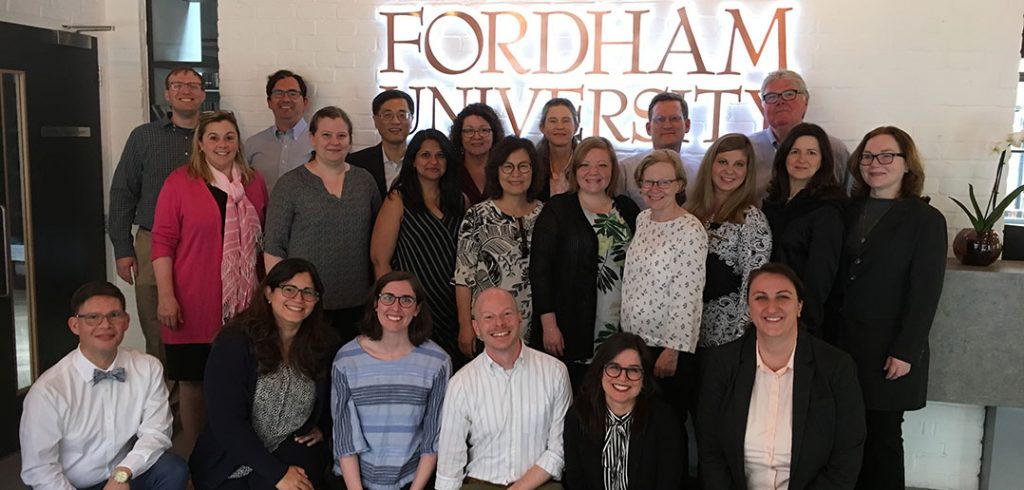Following the success of Fordham’s first Faculty Research Abroad trip to Sophia University in Japan last year, 23 members of Fordham’s faculty, staff, administration, and student body came together last month for a three-day symposium in London.
The International Symposium on Digital Scholarship took place from June 3 to 5 at Birkbeck College and Fordham’s London Centre. Sponsored by the University’s Office of Research, it featured a mix of lectures, workshops, and formal and informal gatherings geared toward furthering research opportunities and international collaborations.
If last year’s gathering illustrated how cross-border collaboration is key to tackling vexing challenges of our time, the London gathering showed how, in the digital realm, no one discipline can go it alone.
Bringing Technology and Scholarship Together
“Digital scholarship is notable for its interdisciplinary nature, since it involves not only IT and computer science, but also the humanities, social sciences, and schools of education,” said Maryanne Kowaleski, Ph.D., the academic coordinator for the digital symposium.
The Joseph Fitzpatrick S.J. Distinguished Professor of History and Medieval Studies and curator of Fordham’s Medieval Sources Bibliography, Kowaleski has deep connections to both London and the digital humanities.
In London, she delivered a keynote address, “Giving Credit Where Credit is Due: Acknowledging Collaborative Work in Digital Scholarship Projects.” She also presented a research project that touches on both London and the digital realm, titled “Prosopography, Database Design, and Linked Data in the Medieval Londoners Project.”
The project is a collaboration with Katherina Fostano, visual resources coordinator in the department of Art History, and Kowaleski said it was notable that Fostano presented at the conference, as did Elizabeth Cornell, Ph.D., director of communications at Fordham’s department of information technology. Adding professional staff such as librarians and graduate students to the mix, was key to the conference’s success, she said.
“One of the things that my research shows, and that I have experienced, is how crucial librarians are to digital efforts now. I’m grateful that Fordham has included them in this program,” she said.
London and New York, Working as a Team
Representing the Graduate School of Education (GSE), Professor of Childhood Special Education Su-Je Cho, Ph.D, and doctoral student Kathleen Doyle jointly presented “Using a Digital Learning Platform to Increase Levels of Evidence-Based Practices in Global Teacher Education Programs.” It detailed Project REACH, a U.S. Department of Education-funded initiative that makes widely available the best evidence-based practices for training prospective teachers.
George Magoulas, Ph.D., Alex Poulovassilis, Ph.D., and Andrea Cali, Ph.D., members of Birkbeck College’s Knowledge Lab, helped them collect and analyze data through the website.
Working with a partner in London made sense for this project, Cho said, because one of her goals is for Project REACH to get more use internationally. She, Doyle, and the GSE’s Alesia Moldavan, Ph.D., assistant professor of mathematics education, will collaborate with Christine Edwards-Leis, Ph.D., associate dean of research, and enterprise and doctoral student Jennifer Murray from St. Mary’s College in London on a new endeavor geared toward student teachers’ mental health. Once finished, it will be incorporated into Project REACH.
“The student teaching experience is very stressful, because it’s not their own classroom they have to student teach in. It’s someone else’s classroom. By providing this kind of platform, they can also share their concerns and knowledge and frustrations with the students overseas,” she said.
For Doyle, the trip was an opportunity to see how colleagues from other disciplines assemble collaborative teams.
“I really appreciated learning across the fields. Being in the Graduate School of Education, I’ve been mainly focused on that field. It was refreshing to hear about the other ways digital scholarship is utilized in other disciplines,” she said.
Urban Challenges That Cross Borders
Gregory T. Donovan, Ph.D., assistant professor of communication and media studies, presented “Keeping Place in ‘Smart’ Cities: Situating the Settlement House as a Means of Knowing and Belonging in the Informational City.” The project, which he is developing with the assistance of Melissa Butcher, Ph.D., reader in social and cultural geography at Birkbeck College, will highlight the efforts of New York City’s Lincoln Square Neighborhood Center and London’s Toynbee Hall.
The project will focus on the “settlement house” model of community center that was founded a century ago to confront segregation and displacement and promote belonging.
“New York City and London are examples of global cities that are going through significant technological change, both in terms of the cities themselves becoming more digitized as well as the economy and the kinds of jobs and the kinds of education that’s being elevated. With that comes all kinds of difficult changes and gentrification that causes displacement,” said Donovan, who is also organizing November symposium at Fordham called Mapping (in)justice.
“We’re going to look at how we might network [Lincoln Square and Toynbee] through digital technology and think about how they’re managing to keep pace in these communities that are often being displaced in this kind of digital gentrification.”

